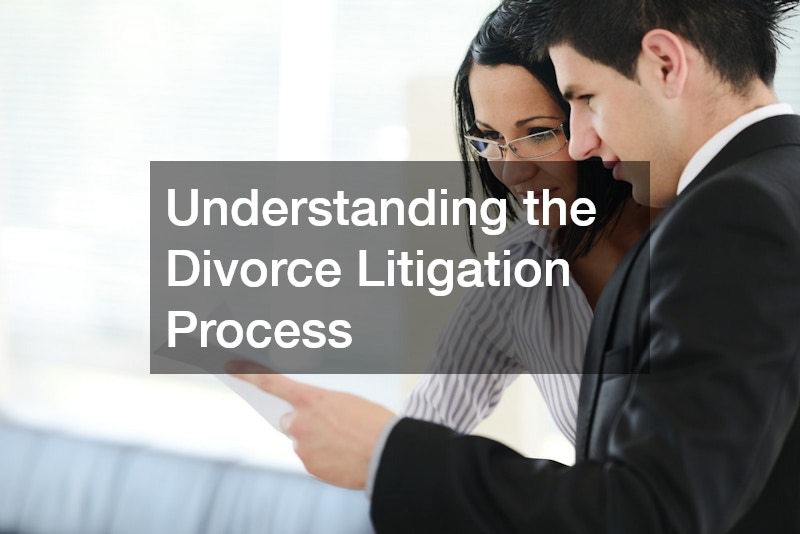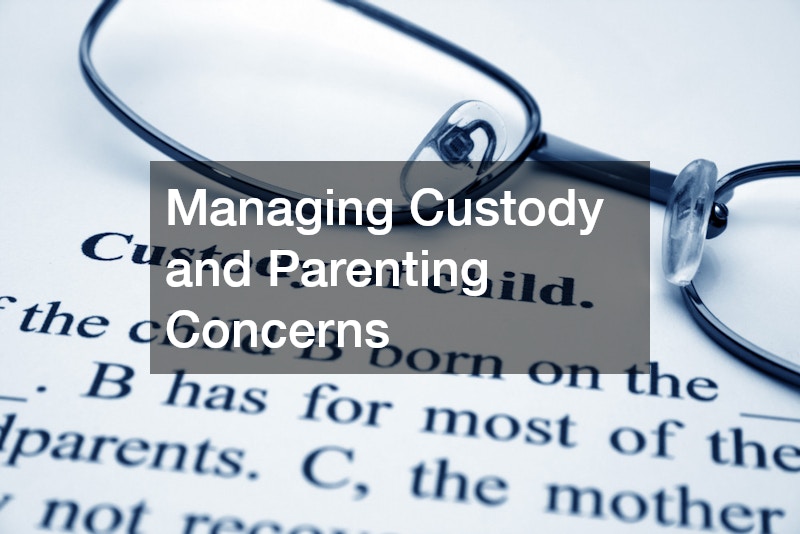Divorce is never easy, but when the process turns into a legal battle, the emotional and logistical stakes rise significantly. Divorce litigation can be overwhelming, confusing, and deeply personal, especially when major life aspects like finances, parenting, and property are on the line. Unlike amicable separations or mediated divorces, litigation involves the court system, formal legal representation, and often, drawn-out proceedings.
Yet, with the right knowledge and preparation, navigating divorce litigation doesn’t have to feel like entering a storm without an umbrella. Understanding how the process works, what to expect, and how to protect your rights allows you to regain some control during a highly turbulent time. This blog will guide you through essential aspects of divorce litigation—from legal processes and emotional preparation to custody issues and post-divorce planning—so you can face this chapter with clarity, confidence, and support.
Understanding the Divorce Litigation Process

Divorce litigation begins when one party files a complaint for divorce, triggering a series of legal steps that may involve court hearings, discovery, negotiations, and ultimately, a trial if no agreement is reached. Unlike collaborative or mediated divorces, litigation places both parties in adversarial roles, often requiring formal evidence submission and testimony. This can be a drawn-out and expensive path, but it is sometimes necessary when couples are unable to resolve key disputes through other means.
Working with a qualified divorce attorney is one of the most important decisions you can make in divorce litigation. These professionals understand not only the mechanics of family law but also how to advocate for your interests within the courtroom setting. A skilled attorney can help you navigate filings, gather necessary evidence, and present your case effectively to a judge. Their experience becomes especially important when facing complex issues such as child custody or contested assets, where the outcome can significantly impact your future.
Preparing Emotionally for Litigation
While much attention is given to the legal and financial aspects of divorce litigation, emotional preparation is equally vital. Entering litigation without acknowledging the stress, grief, or anxiety you may feel can leave you vulnerable and reactive during key moments. Courtroom settings, depositions, and confrontations with a spouse can be emotionally charged, and without the right mindset, they may cloud your judgment or derail your objectives. Taking care of your mental health during this process is not just self-care—it’s strategic.
In some cases, the emotional stress of divorce litigation is compounded by financial uncertainty. Struggling to maintain stability can lead to fear-driven decisions that compromise your long-term well-being. This is where services like bankruptcy assistance may come into play for some individuals, particularly when debt, asset division, or business ownership is involved. Facing financial hardship head-on with professional support allows you to better cope with the emotional burden and make decisions with a clearer head. Remember, emotional resilience in litigation isn’t about eliminating stress; it’s about learning how to manage it effectively as you move through each legal stage.
Gathering Essential Financial Documents
One of the earliest and most critical steps in divorce litigation is collecting and organizing your financial records. Courts rely heavily on documented evidence to make fair and informed decisions about asset division, spousal support, and other financial matters. This includes income statements, tax returns, mortgage information, bank account statements, retirement account details, and any records related to joint or individual debts. The more thorough your documentation, the stronger your position during negotiation or trial. Being proactive with financial preparation can also speed up the litigation process and reduce potential conflicts.
In cases involving significant or complex assets, such as real estate, inheritance, or trusts, understanding estate law becomes especially important. Overlapping areas between divorce litigation and estate planning may require professional insight to determine what’s legally divisible and what remains separate property. For example, if you or your spouse received a large inheritance during the marriage, its treatment during litigation could depend on how it was handled and whether it was commingled. Consulting experts in estate law alongside your divorce attorney ensures you don’t overlook valuable assets or unknowingly forfeit rights.
Choosing the Right Divorce Attorney

Selecting the right legal representation in divorce litigation is not a decision to take lightly. A good attorney serves not just as your advocate in court, but as your guide through an emotionally charged and legally complex process. Look for someone who has experience with contested divorces, strong communication skills, and a style that matches your needs—whether you want someone aggressive, strategic, or empathetic. Remember, this is someone who will help you make crucial decisions about your family, finances, and future, so trust and compatibility are essential.
For individuals navigating custody battles or perceived gender-based bias in family court, consulting a fathers rights lawyer can be particularly beneficial. These attorneys specialize in advocating for paternal rights, ensuring that fathers have equal consideration in custody and parenting time decisions. In many divorce litigation cases, the involvement of a fathers rights lawyer can shift the narrative and bring attention to overlooked concerns, such as equitable co-parenting and child support calculations.
Communicating Effectively With Legal Counsel
Once you’ve hired an attorney, the effectiveness of your working relationship can significantly influence the outcome of your divorce litigation. Clear, honest, and timely communication is crucial. Your lawyer can only advocate for your best interests if they have all the facts—and that includes not just the favorable ones. Be upfront about challenges, concerns, and any past legal issues so they can prepare accordingly. Additionally, respect your attorney’s time and processes: organize your documents, respond to inquiries quickly, and trust their expertise, even if the advice is hard to hear.
Even in litigation-heavy divorces, there may be opportunities to resolve specific issues through alternative dispute resolution. Your lawyer may consult with a mediation attorney to address individual disputes before they escalate into trial-level conflicts. While mediation is a separate process from litigation, these professionals can help identify compromises in child custody, asset division, or visitation that benefit both parties.
Addressing Property Division Fairly
When it comes to splitting property in divorce litigation, fairness doesn’t always mean a clean 50/50 divide. Courts consider several factors, including the length of the marriage, each party’s contributions (both financial and non-financial), and future needs. This process is called equitable distribution, and it can include everything from the family home and vehicles to investments, pensions, and business interests. Property division can become especially heated when one party believes the other is hiding assets or undervaluing shared property, which can trigger forensic evaluations or extended legal disputes.
In contentious cases, property division may even intersect with housing instability. For example, one spouse may attempt to remove the other from a shared residence, leading to urgent legal questions about who has the right to remain. In such scenarios, an eviction defense attorney might become relevant, particularly if temporary orders or misuse of the legal system are involved. While not a typical player in divorce litigation, their expertise can help protect your housing rights while the broader case is underway. Ensuring your legal team understands the full scope of property-related risks can help avoid crisis situations during and after litigation.
Managing Custody and Parenting Concerns

Parenting issues are among the most sensitive and contested areas in divorce litigation. Determining where the children will live, how time will be shared, and who will make important decisions about health, education, and upbringing can create intense emotional strain. Courts prioritize the best interests of the child, which means the judge will assess each parent’s involvement, stability, and ability to cooperate. Being prepared to demonstrate your parenting role with documentation—such as school records, schedules, or correspondence—can greatly strengthen your position during custody evaluations.
Understanding child custody law is essential to navigating these disputes effectively. Custody arrangements may be physical (where the child lives) or legal (who makes decisions), and can be joint or sole depending on the circumstances. In divorce litigation, failure to understand these legal distinctions can lead to misunderstandings and unintended concessions. An attorney with expertise in child custody law can help you craft a proposal that aligns with legal standards while protecting your parental rights. If your case involves complex factors—such as relocation, special needs, or allegations of misconduct—legal guidance becomes even more critical to achieving a fair and stable arrangement for your children.
Handling Court Appearances With Confidence
Court appearances are a routine part of divorce litigation, and being prepared can make a significant difference in how you’re perceived by the judge. Dress appropriately, arrive early, and bring all necessary documentation. Equally important is your demeanor—speak respectfully, stay calm even if provoked, and avoid making emotional outbursts. Judges appreciate individuals who are composed, organized, and cooperative, which can influence decisions in your favor. Your attorney will guide you on what to expect and how to respond to direct questions or testimony.
In high-conflict divorces, physical safety and access to property can become concerns, especially when disputes involve restraining orders, sudden lockouts, or attempts to gain unauthorized access to shared spaces. In extreme cases, a locksmith may be called in to re-secure a home, either for safety or legal compliance following a court order. While it may seem like an unusual detail, managing access and control over shared residences can play a strategic role in divorce litigation. Ensuring that all security measures align with legal directives is just another way to protect yourself and your rights during a volatile process.
Reducing Conflict During Proceedings
One of the best ways to manage the stress and length of divorce litigation is to actively minimize unnecessary conflict. While some disputes are unavoidable, many arguments stem from miscommunication, emotional triggers, or power struggles. Staying focused on the end goals—such as fair asset division, a stable parenting plan, and emotional closure—can help you pick your battles wisely. Establishing clear boundaries with your ex-spouse and keeping communication civil (or through legal representatives when needed) helps prevent escalation and keeps the process from derailing.
For parents, reducing conflict is also essential for protecting their children’s well-being during litigation. Keeping routines stable and shielding kids from adult disagreements can make a world of difference in how they adjust. In many families, reliable day care services provide structure and support while parents attend court, meetings, or simply manage the emotional toll of proceedings. Knowing your child is safe and cared for gives you the bandwidth to focus on the demands of divorce litigation without added guilt or anxiety.
Planning for Life After Divorce

While the focus of divorce litigation is often on surviving the current legal battle, it’s just as important to think about what comes after. Post-divorce life brings new responsibilities and routines, whether you’re co-parenting, managing finances alone, or adjusting to a different living arrangement. Setting realistic expectations for the future—emotionally, financially, and socially—can help you transition more smoothly. Start envisioning your next chapter with practical goals, whether it’s building a new support system, revising your financial plan, or simply creating a peaceful home environment.
One often-overlooked part of post-divorce planning is caring for pets, who can be affected by changing households, stress, or moves. During intense periods of divorce litigation, using pet boarding services can provide a safe, temporary solution while you attend court dates or finalize living arrangements. Just as child care helps protect your children’s stability, responsible pet care ensures your furry companions are not caught in the chaos. Looking after every member of your family—including your pets—is a vital part of regaining balance and building a healthy life beyond litigation.
Divorce litigation is a uniquely challenging experience—legally complex, emotionally intense, and deeply personal. Unlike amicable separations, litigation requires individuals to navigate court systems, legal arguments, and sometimes aggressive opposition, all while managing the emotional fallout of a major life transition. But despite its difficulty, this process can also be empowering. With the right preparation, guidance, and support, you can protect your interests, advocate for your family, and emerge with a clear path forward.
Whether you’re gathering documents, hiring a divorce attorney, or planning for your children’s and pets’ well-being, every step you take in divorce litigation contributes to your long-term stability and peace of mind. By staying informed and proactive, you shift from a place of reaction to one of strategy and strength. Divorce may mark the end of one chapter, but with thoughtful planning and resilience, it also creates space for new beginnings. No matter where you are in the process, remember: you’re not just surviving litigation—you’re building the foundation for your next phase of life.

